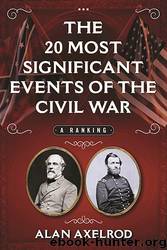The 20 Most Significant Events of the Civil War by Alan Axelrod

Author:Alan Axelrod
Language: eng
Format: epub
Publisher: Skyhorse Publishing
Published: 2017-07-07T04:00:00+00:00
12
July 4, 1863
Vicksburg falls to Grant
Why it’s significant: The successful conclusion to Grant’s epic siege of Vicksburg, Mississippi, on July 4, 1863, secured Union control of the Mississippi River and its vast valley, cutting the Confederacy in two and effectively ending any hope for a Southern victory. With the Union triumph at Gettysburg the day before, the fall of Vicksburg was a major turning point in the war.
BY THE TIME of the Civil War, Winfield Scott, who had begun his military career before the War of 1812 and who, more than any other American military leader, brought victory in the US-Mexican War of 1846–1848, was too old and, at considerably more than 300 pounds, much too fat to sit on a horse, let alone ride one. His corpulence and relative immobility had not extinguished his affection for ornate uniforms. His raiment was resplendent in gold leaves, massive epaulettes, and a bicorne hat that put Napoleon’s in the shade. The picture was laughable, but, forgetting the hero of earlier days, one of the nation’s truly prodigious military figures, the press saw only the gilded brass and the aging flesh. He was widely dismissed as “Old Fuss and Feathers,” and his plan for victory was denounced as inglorious, even cowardly. Rather than waste lives in a fruitless offensive against Richmond, Scott proposed a naval blockade of the Atlantic and Gulf coasts and simultaneous seizure of control over Mississippi River navigation. This accomplished, he wanted to conduct an offensive not from the front but from the western flank.
Scorned in 1861, “Scott’s Anaconda” (so called because the naval blockade was supposed to strangle the South in the manner of some great constrictor) was looking pretty good by 1863. With the spectacular growth of the Union navy, the blockade was inexorably throttling the South, and, while the war raged hottest near the eastern seaboard, Major General Henry Wager Halleck, the army’s general in chief from July 1862 to March 1864, observed, “the opening of the Mississippi River will be to us more advantage than the capture of forty Richmonds,” in effect echoing Scott’s original assertion. As Ulysses S. Grant explained long after the war in his Personal Memoirs, the Mississippi town of “Vicksburg was the only channel … connecting parts of the Confederacy divided by the Mississippi. So long as it was held by the enemy, the free navigation of the river was prevented. Hence its importance.”
In 1862, while the attention of most of the nation, North and South, was focused on the bloody duel between the Army of Northern Virginia and the Army of the Potomac in the southeast, Grant was taking Fort Henry on the Tennessee River (February 6, 1862) and Fort Donelson on the Cumberland (February 11–16, 1862). Confederate Major General Edmund Kirby Smith, having pulled out of Knoxville, Tennessee, invaded Kentucky in August 1862, and Confederate General Braxton Bragg and Union General Don Carlos Buell contested ground in these states. Gradually, Buell’s pressure pushed the fighting farther southwest, into Mississippi. On September 19, 1862, Confederate Sterling Price suffered a sharp defeat at the hands of William S.
Download
This site does not store any files on its server. We only index and link to content provided by other sites. Please contact the content providers to delete copyright contents if any and email us, we'll remove relevant links or contents immediately.
| Africa | Americas |
| Arctic & Antarctica | Asia |
| Australia & Oceania | Europe |
| Middle East | Russia |
| United States | World |
| Ancient Civilizations | Military |
| Historical Study & Educational Resources |
Cat's cradle by Kurt Vonnegut(15295)
Pimp by Iceberg Slim(14464)
4 3 2 1: A Novel by Paul Auster(12354)
Underground: A Human History of the Worlds Beneath Our Feet by Will Hunt(12073)
The Radium Girls by Kate Moore(12001)
Wiseguy by Nicholas Pileggi(5743)
The Fire Next Time by James Baldwin(5409)
Perfect Rhythm by Jae(5382)
American History Stories, Volume III (Yesterday's Classics) by Pratt Mara L(5285)
Paper Towns by Green John(5162)
Pale Blue Dot by Carl Sagan(4981)
A Higher Loyalty: Truth, Lies, and Leadership by James Comey(4937)
The Mayflower and the Pilgrims' New World by Nathaniel Philbrick(4474)
The Doomsday Machine by Daniel Ellsberg(4473)
Killers of the Flower Moon: The Osage Murders and the Birth of the FBI by David Grann(4423)
The Sympathizer by Viet Thanh Nguyen(4370)
Too Much and Not the Mood by Durga Chew-Bose(4319)
The Borden Murders by Sarah Miller(4298)
Sticky Fingers by Joe Hagan(4171)
